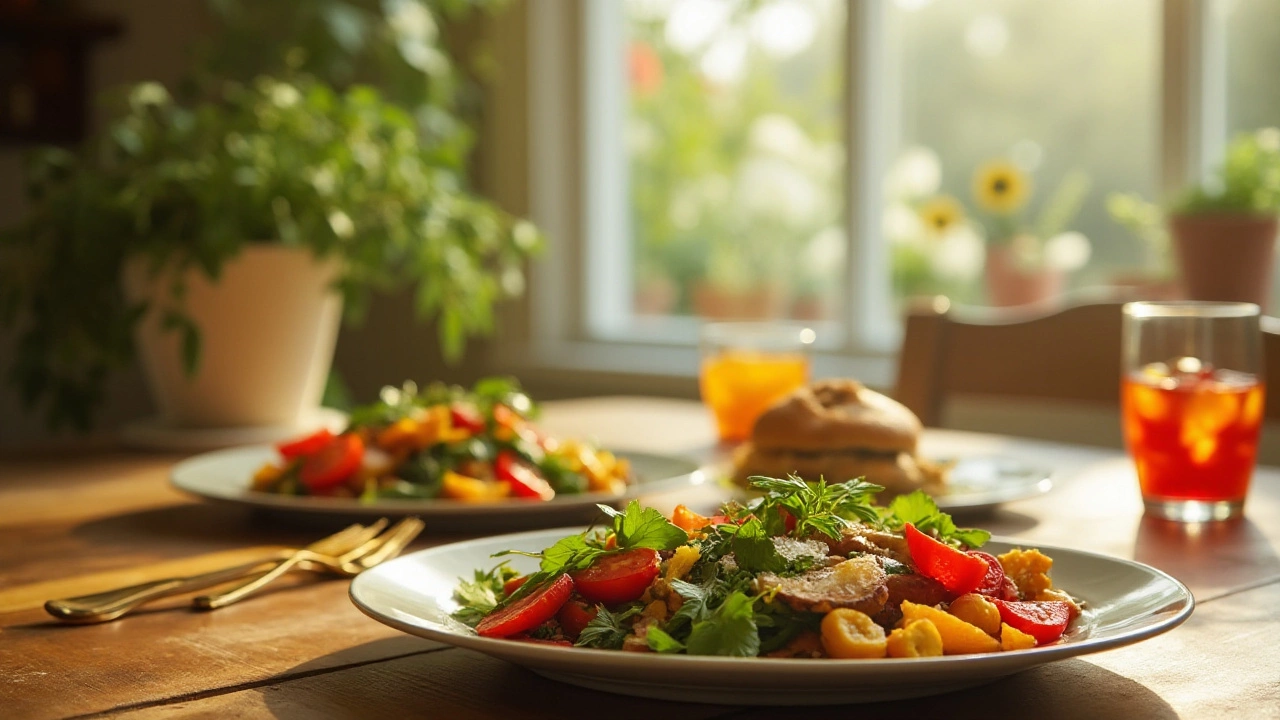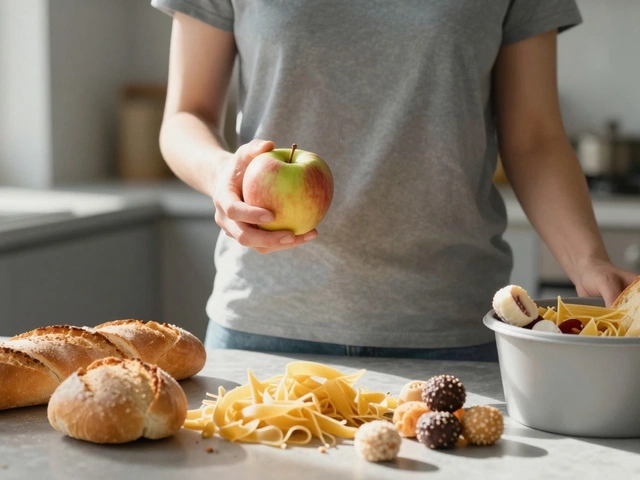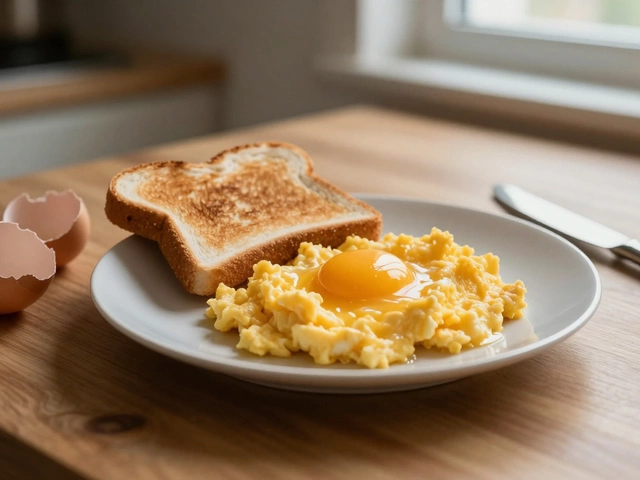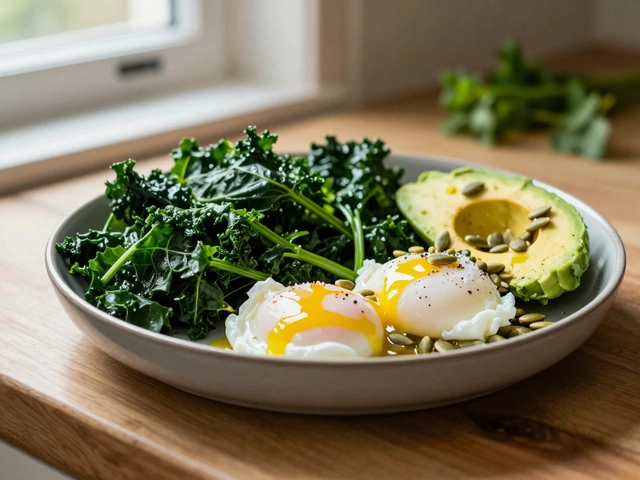People often wonder if switching to a vegan diet can help in shedding those extra pounds. However, it's not just about eliminating animal products. A conscious, well-planned approach is key to effective weight management on a plant-based diet.
Whether you're looking to lose weight or simply improve your health, understanding the impact of a vegan diet is crucial. This includes exploring how it affects your metabolism, energy levels, and overall well-being. Embracing a variety of fruits, vegetables, and whole grains can lead to a lighter, healthier lifestyle.
Let's journey through the essentials you need to know about losing weight while going vegan and learn some mouth-watering recipes to make the transition enjoyable.
- Understanding Vegan Diets
- Vegan Diet and Weight Loss
- Nutrient-Rich Foods for Vegans
- Simple Vegan Recipes for Weight Loss
Understanding Vegan Diets
Embarking on a vegan diet can feel like stepping into a vibrant world full of flavors and textures derived purely from plants. At its core, a vegan diet omits all animal products, including meat, dairy, and eggs, while embracing a variety of nuts, seeds, fruits, vegetables, grains, and legumes. This dietary choice is often rooted in ethical, environmental, or health motivations. One prominent aspect of the vegan diet is its potential to positively impact the planet; cutting out animal products can significantly reduce one's carbon footprint. Research indicates that plant-based diets can use a remarkable amount less water and land compared to meat-based diets, addressing crucial ecological concerns. Equally appealing is the health dimension of veganism, which has been linked to lower risks of heart disease and certain types of cancer. Yet, to reap these benefits, one must strategically source nutrients often found in animal products.
Transitioning to this lifestyle doesn't merely mean cutting out animal ingredients; it involves a harmonious balance. Vital nutrients such as protein, calcium, iron, and vitamin B12 require attention as their typical dietary sources are of animal origin. However, robust alternatives exist in the plant kingdom. For instance, lentils, chickpeas, and quinoa serve as fantastic protein sources. Fortified plant milks and tofu can fulfill calcium needs. Even iron can be derived from deep greens like spinach and fortified cereals, though pairing them with vitamin C-rich foods aids absorption. Vitamin B12 remains a bit tricky, typically necessitating supplementation or fortified foods. Devoting time to meal planning ensures not just survival, but thriving on a vegan diet.
"The vegan lifestyle is a spiritual choice, a commitment to living with greater awareness and compassion," wrote Dr. Will Tuttle, author of 'The World Peace Diet'.
The rising popularity of veganism has led supermarkets and restaurants to expand their offerings. It is no longer unusual to find vegan versions of almost every dish imaginable. Even fast food chains have hopped on the bandwagon, helping dismantle the myth that vegan diets are limiting or boring. Yet, the crux still lies in embracing whole foods rather than overly processed alternatives. By opting for meals rich in fresh produce and grains rather than solely relying on packaged goods, vegans can maintain both their health and their weight loss goals. An added boon is the fiber content inherent in plant-based eating, promoting digestive health and satiety, which can naturally aid weight control.
An understanding of nutritional science is paramount in effectively adopting a vegan diet. A study by the Adventist Health Studies found that vegan participants had consistently lower body mass indexes than their meat-eating counterparts. They also exhibited lower cholesterol levels and blood pressure readings. Key to such promising statistics is the careful integration of a variety of foods to sustain all nutrient levels. Integrating colorful plates with diverse food groups ensures not just nutrient density but a spectrum of flavors. Such cooking adventures open taste buds to the wonders of global cuisines, introducing items like tofu from Asia, quinoa from South America, and hummus from the Mediterranean, crafting a delightful culinary tapestry.

Vegan Diet and Weight Loss
Embarking on a vegan diet can bring about significant changes to your body, especially when the ultimate goal is weight loss. The plant-based lifestyle is often low in calories but nutrient-packed, enhancing your ability to shed weight effectively. By focusing on plants, you're likely to consume more fiber, which aids in digestion and promotes a feeling of fullness. Lower calorie intake and higher nutritional benefits make this a favorite choice for many individuals aiming for a healthier lifestyle.
Protein, often considered the missing piece in a vegan diet, can be sufficiently obtained from sources like legumes, tofu, and quinoa. Incorporating these foods helps maintain muscle mass, critical for effective weight management. In doing so, the body burns calories even at rest, boosting metabolism and contributing to the weight loss journey. It's crucial to balance carbohydrates, proteins, and healthy fats to ensure you're getting all necessary nutrients while avoiding over-consumption of processed foods, which can hinder your progress.
"A well-planned vegan diet can have a positive impact on weight loss and overall health," explains Dr. Neal Barnard, president of the Physicians Committee for Responsible Medicine.
Another benefit of a vegan diet is its inherent reduction of harmful fats. Most plant foods are low in saturated fats, making it easier for the body to metabolize energy and reduce storage of excess fat. Additionally, an abundance of vitamins and antioxidants from fresh fruits and vegetables can result in not just weight loss, but improved skin health, energy levels, and mental clarity. This wholesome nutrition can support your goals sustainably rather than the boom-and-bust cycle many other diets tend to trigger.
Creating a Balanced Vegan Meal Plan
Planning one's meals ahead of time ensures you get the right balance of nutrients while managing portion sizes, which is essential when aiming for weight loss. Begin with a rich breakfast; oats, fortified plant-based milk, and fruits provide energy to start your day and keep you full longer. Lunch could be a hearty salad with chickpeas or lentils for protein, garnished with a variety of colorful vegetables. Don’t forget about healthy fats from sources like avocado or nuts. These not only taste delicious but play a role in nutrient absorption.
Dinner options can vary; a stir-fry loaded with vibrant veggies or a comforting bowl of soup can often satisfy both your hunger and taste buds. Remember to stay hydrated, as water aids in digestion. The simplicity of this plant-based approach encourages exploration of seasonal produce, making meals both dynamic and nutritious.
| Benefits of Vegan Diet | Potential Drawbacks |
|---|---|
| Promotes weight loss | May lack certain nutrients if not properly planned |
| Enhances gut health | Requires careful diet planning |
| Supports heart health | Might lead to initial cravings |
| Increases energy levels | Initial transition may be challenging |
Ultimately, undertaking a vegan diet for weight loss can be a fruitful endeavor when paired with understanding and respect for your body's needs. By consuming whole foods and keeping processed products to a minimum, you not only open the door to weight loss but also to a host of health benefits.

Nutrient-Rich Foods for Vegans
Adopting a vegan lifestyle means paying close attention to plant-based sources of essential nutrients that were previously derived from animal products. Mastering the art of a balanced vegan diet involves knowing which foods pack a nutritional punch while also satisfying hunger in a wholesome way. A typical vegan diet consists of fruits, vegetables, legumes, grains, nuts, and seeds, each offering unique nutritional benefits. For instance, leafy greens such as spinach and kale are packed with iron and calcium, crucial for maintaining strong bones and energy levels. These greens often serve as valuable replacements for dairy-derived nutrients, and integrating them into various meals can be both delicious and beneficial.
Legumes like lentils, chickpeas, and black beans are powerhouse foods when it comes to protein content for healthy eating. They play a crucial role in building muscle and repairing tissues. Not only are these legumes incredibly versatile, easily fitting into soups, stews, salads, and even burgers, but they also provide a substantial amount of fiber. Fiber is key in maintaining a feeling of fullness, which can aid weight management. Did you know that a cup of cooked lentils contains about 18 grams of protein? That's comparable to some meat options. So, they are essential in a vegan diet focused on weight loss.
Nuts and seeds, though small, are mighty when it comes to providing concentrated doses of vital nutrients. Almonds, chia seeds, and flaxseeds are not only sources of healthy fats but also supply omega-3 fatty acids, which support heart health. Incorporating them into your diet can be as simple as adding a handful of almonds to your morning oatmeal or a tablespoon of flaxseed into your smoothie. A common misconception is that these foods are too calorie-dense for weight loss. However, their nutrient density makes them worthy components of a balanced diet when consumed in moderation.
According to a Harvard study, "A moderate-fat plant-based diet is effective for body weight management." This highlights the importance of incorporating nutrient-dense, calorie-conscious foods into a vegan lifestyle to support overall health and wellness.
Whole grains such as quinoa, brown rice, and oats play an integral part in a vegan diet by delivering essential carbohydrates, proteins, vitamins, and minerals. Unlike refined grains, which are stripped of valuable nutrients, whole grains retain their germ and bran, providing much-needed dietary fiber and other nutrients. For instance, quinoa is a complete protein, meaning it contains all nine essential amino acids. Including varied whole grains in your meals not only diversifies your food palette but also helps control weight by keeping you satiated longer.
Exploring fermented foods like tempeh and kimchi can introduce beneficial gut bacteria, aiding digestion and absorption of nutrients. Tempeh is a fermented soy product that offers impressive protein content and a rich, savory flavor that enhances many dishes. It's an excellent choice for those looking to maintain a balanced gut microbiome, which is essential for weight loss as it affects both digestion efficiency and hormone regulation. Thus, ensuring your vegan menu is filled with these nutrient-dense foods can support a thriving and healthy life.

Simple Vegan Recipes for Weight Loss
Embarking on a vegan journey doesn't mean you have to sacrifice flavor or satisfaction. In fact, when it comes to shedding pounds, a vegan diet can be both nutritious and delicious. Imagine the vibrant colors and rich flavors that come with an array of plant-based dishes. By incorporating key foods such as leafy greens, whole grains, and legumes, you can enjoy meals that are not only healthy but also aid in weight loss. The magic lies in choosing foods that are high in fiber and low in calories, keeping you full without overeating. Let's delve into some simple yet effective vegan recipes that can help you achieve your weight loss goals.
Hearty Lentil Soup
Lentils are nutrient powerhouses, providing a quick source of protein and fiber with minimal calories. This hearty lentil soup is perfect for dinners or even lunches. Begin by sautéing onions, garlic, and celery in a pot until they soften. Add chopped carrots, a can of diced tomatoes, and a cup of rinsed lentils. Pour in vegetable broth and bring the mixture to a boil. Simmer until the lentils are tender. Season with salt, pepper, and a dash of cumin for a warm, comforting bowl that's as filling as it is healthy.
Quinoa Salad with Mixed Greens
Quinoa is renowned for being a complete protein, making it a fantastic base for a vegan salad. Start by cooking a cup of quinoa according to package instructions. Once cooled, toss it with a mix of leafy greens like spinach and arugula. Add colorful veggies like cherry tomatoes and bell peppers for crunch. Dressing can be as simple as a squeeze of lemon juice, olive oil, salt, and pepper. This salad is light yet satisfying, perfect for a midday meal that won't weigh you down.
A well-planned vegan diet is rich in nutrients, promoting a healthier lifestyle for most people. - Harvard Health Publishing
Chickpea Stir-fry
Chickpeas, also known as garbanzo beans, are versatile legumes that provide ample protein and fibers, making them ideal for weight loss. For a quick stir-fry, cook sliced bell peppers, zucchini, and broccoli in a skillet with olive oil. Add canned chickpeas and season with soy sauce, ginger, and garlic powder. Cook until the vegetables are tender yet crisp, and the chickpeas are heated through. Serve this vibrant dish over a bed of steamed brown rice for a complete meal.
Warm Berry Oatmeal
Start your day right with a bowl of oatmeal that keeps you full and energized. Oats are high in soluble fiber, which is known to assist in weight loss. Prepare oatmeal using almond or soy milk. Once cooked, sweeten with a touch of maple syrup or agave. Top with a generous helping of mixed berries, rich in antioxidants and low in calories. A spoonful of flaxseed or chia seeds can add a nutritional boost. This breakfast is cozy and heartwarming, setting the tone for a healthy day.
By diving into these simple vegan recipes, you not only embrace a healthier lifestyle but also enjoy the myriad flavors that plant-based foods have to offer. These dishes are specifically designed to support your weight loss journey, ensuring that you get the essential nutrients your body needs. Bon appétit, and may your vegan adventure be both fulfilling and delightful.





